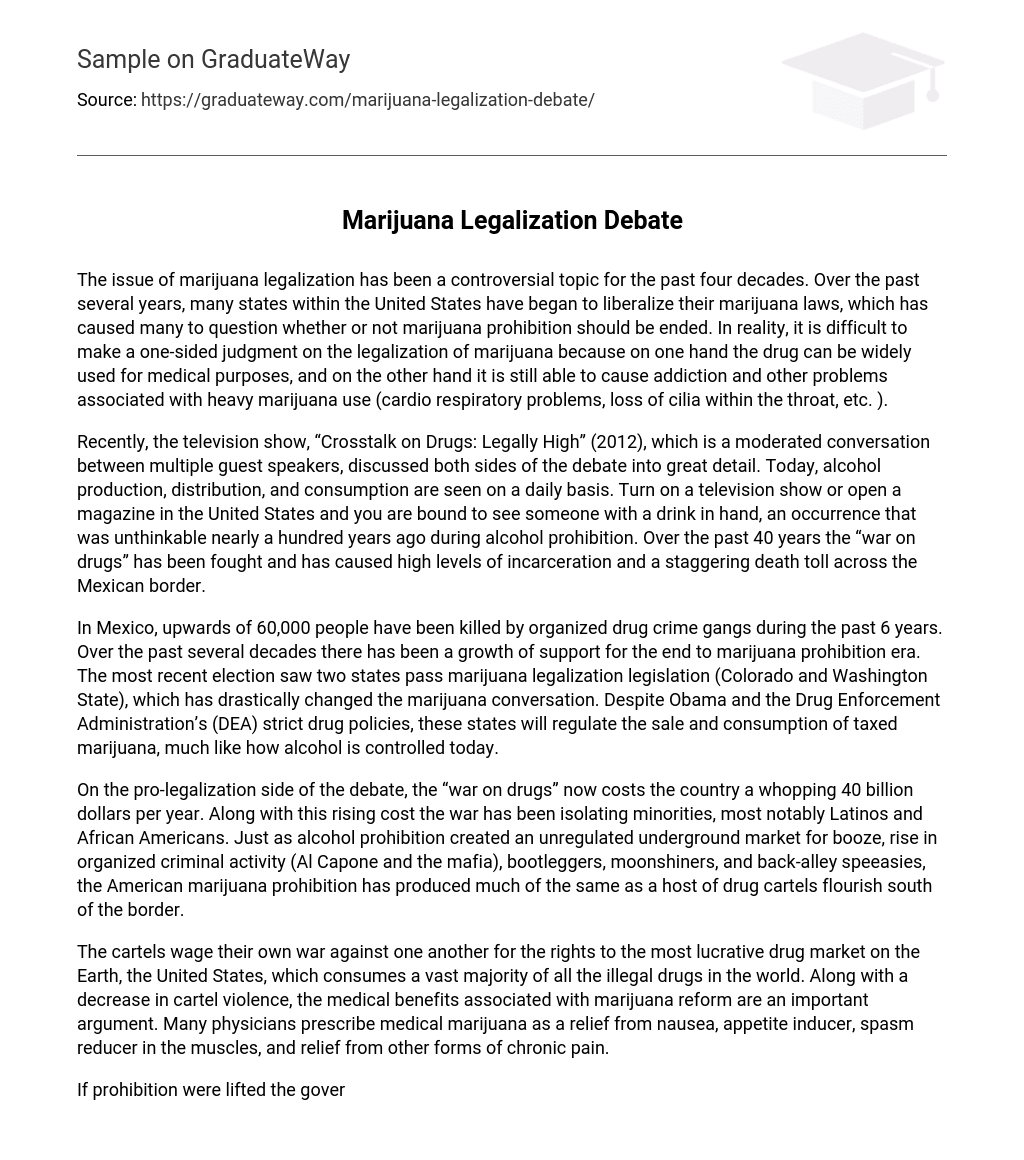The issue of marijuana legalization has been a controversial topic for the past four decades. Over the past several years, many states within the United States have began to liberalize their marijuana laws, which has caused many to question whether or not marijuana prohibition should be ended. In reality, it is difficult to make a one-sided judgment on the legalization of marijuana because on one hand the drug can be widely used for medical purposes, and on the other hand it is still able to cause addiction and other problems associated with heavy marijuana use (cardio respiratory problems, loss of cilia within the throat, etc. ).
Recently, the television show, “Crosstalk on Drugs: Legally High” (2012), which is a moderated conversation between multiple guest speakers, discussed both sides of the debate into great detail. Today, alcohol production, distribution, and consumption are seen on a daily basis. Turn on a television show or open a magazine in the United States and you are bound to see someone with a drink in hand, an occurrence that was unthinkable nearly a hundred years ago during alcohol prohibition. Over the past 40 years the “war on drugs” has been fought and has caused high levels of incarceration and a staggering death toll across the Mexican border.
In Mexico, upwards of 60,000 people have been killed by organized drug crime gangs during the past 6 years. Over the past several decades there has been a growth of support for the end to marijuana prohibition era. The most recent election saw two states pass marijuana legalization legislation (Colorado and Washington State), which has drastically changed the marijuana conversation. Despite Obama and the Drug Enforcement Administration’s (DEA) strict drug policies, these states will regulate the sale and consumption of taxed marijuana, much like how alcohol is controlled today.
On the pro-legalization side of the debate, the “war on drugs” now costs the country a whopping 40 billion dollars per year. Along with this rising cost the war has been isolating minorities, most notably Latinos and African Americans. Just as alcohol prohibition created an unregulated underground market for booze, rise in organized criminal activity (Al Capone and the mafia), bootleggers, moonshiners, and back-alley speeasies, the American marijuana prohibition has produced much of the same as a host of drug cartels flourish south of the border.
The cartels wage their own war against one another for the rights to the most lucrative drug market on the Earth, the United States, which consumes a vast majority of all the illegal drugs in the world. Along with a decrease in cartel violence, the medical benefits associated with marijuana reform are an important argument. Many physicians prescribe medical marijuana as a relief from nausea, appetite inducer, spasm reducer in the muscles, and relief from other forms of chronic pain.
If prohibition were lifted the government would see two immediate benefits, besides neutralizing the drug cartels from marijuana production, regulation of the drug would be made possible, which would return the drug to quality control, and a sales tax could be added, which would boost the American economy. On the other side of the debate, detractors of marijuana legalization say that there are serious health consequences to using marijuana. The Drug Enforcement Administration (DEA) has stated that marijuana is a far more powerful drug than it was in the 1960’s and 1970’s.
According to their studies, someone who smokes five joints per week may be taking in as many carcinogenic chemicals as someone who smokes a full pack of cigarettes every day. Anti-legalization supporters also argue that the drug is a gateway to more harmful, addictive substance like cocaine, methamphetamines, and heroin. After viewing the interaction between people from different points of views during this installment of “Crosstalk,” I will be able to continually explore the intricacies involved in the marijuana legalization debate.
Effectively exploring both sides of the argument and discussing it with others will allow me to impartially talk about marijuana, along with the benefits and consequences of using it, to friends, family, son/daughter, colleagues, and students. Also, being a future educator, being impartial will allow me to provide students with a better awareness and knowledge of drugs and the consequences associated with using them to allow the ability for the individual to make an informed decision.





